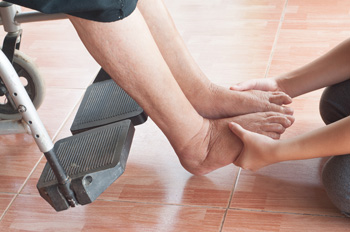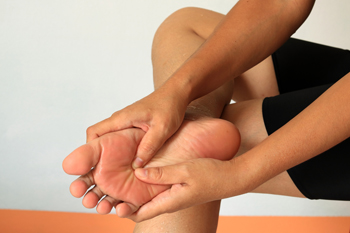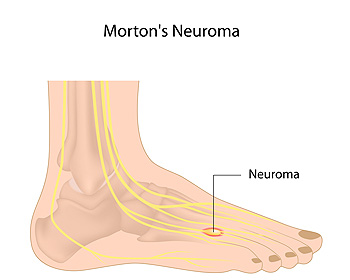Connect With Us
Blog
Items filtered by date: November 2019
Reminder: When Was the Last Time...?
Possible Causes of Poor Circulation
 People who enjoy running and jogging are most likely aware of the complications that can arise from having poor circulation. It may hinder their ability to reach specific goals, which may cause frustration in practicing their chosen sport. Additionally, it can be indicative of health issues, which is why it is so important to be aware of the possible symptoms. These can include numbness, tingling, or foot pain. The feet may feel cold, and appear swollen as well. A common reason why poor circulation may develop can come from peripheral artery disease, which is referred to as PAD. The factors that may lead to this illness can consist of smoking, pregnancy, and heart conditions. Poor circulation may occur in patients who are obese, or who are afflicted with medical conditions that can include diabetes and Raynaud’s disease. Some patients find mild relief when compression stockings are worn, as well as taking up a gentle exercise program. If you are experiencing any of the symptoms that are associated with poor circulation, it is recommended that you consult with a podiatrist who can determine the best treatment options for you.
People who enjoy running and jogging are most likely aware of the complications that can arise from having poor circulation. It may hinder their ability to reach specific goals, which may cause frustration in practicing their chosen sport. Additionally, it can be indicative of health issues, which is why it is so important to be aware of the possible symptoms. These can include numbness, tingling, or foot pain. The feet may feel cold, and appear swollen as well. A common reason why poor circulation may develop can come from peripheral artery disease, which is referred to as PAD. The factors that may lead to this illness can consist of smoking, pregnancy, and heart conditions. Poor circulation may occur in patients who are obese, or who are afflicted with medical conditions that can include diabetes and Raynaud’s disease. Some patients find mild relief when compression stockings are worn, as well as taking up a gentle exercise program. If you are experiencing any of the symptoms that are associated with poor circulation, it is recommended that you consult with a podiatrist who can determine the best treatment options for you.
While poor circulation itself isn’t a condition; it is a symptom of another underlying health condition you may have. If you have any concerns with poor circulation in your feet contact Dr. Nicholas Przystawski of Central Florida Foot Care, PA. Our doctor will treat your foot and ankle needs.
Poor Circulation in the Feet
Peripheral artery disease (PAD) can potentially lead to poor circulation in the lower extremities. PAD is a condition that causes the blood vessels and arteries to narrow. In a linked condition called atherosclerosis, the arteries stiffen up due to a buildup of plaque in the arteries and blood vessels. These two conditions can cause a decrease in the amount of blood that flows to your extremities, therefore resulting in pain.
Symptoms
Some of the most common symptoms of poor circulation are:
- Numbness
- Tingling
- Throbbing or stinging pain in limbs
- Pain
- Muscle Cramps
Treatment for poor circulation often depends on the underlying condition that causes it. Methods for treatment may include insulin for diabetes, special exercise programs, surgery for varicose veins, or compression socks for swollen legs.
As always, see a podiatrist as he or she will assist in finding a regimen that suits you. A podiatrist can also prescribe you any needed medication.
If you have any questions, please feel free to contact our office located in Leesburg, FL . We offer the newest diagnostic and treatment technologies for all your foot care needs.
Read more about Causes Symptoms and Treatment for Poor Circulation in the FeetRunners May Be Prone To Stress Fractures
 Stress fractures may be a common injury among people who enjoy the sport of running and jogging. This can happen from the frequent impact the body endures as the feet consistently hit the ground. This condition typically occurs gradually, and can cause severe pain and discomfort. Common symptoms that are associated with this type of injury can include pain and swelling in the affected foot, and it may be difficult to walk. After a proper diagnosis is performed, which generally consists of having an X-ray taken, treatment can begin. This can include elevating the foot which may reduce a portion of the swelling, and wrapping the foot in an elastic bandage that can be helpful in providing adequate support. If you feel you have developed a stress fracture, it is suggested that you schedule a consultation with a podiatrist who can help you with treatment options.
Stress fractures may be a common injury among people who enjoy the sport of running and jogging. This can happen from the frequent impact the body endures as the feet consistently hit the ground. This condition typically occurs gradually, and can cause severe pain and discomfort. Common symptoms that are associated with this type of injury can include pain and swelling in the affected foot, and it may be difficult to walk. After a proper diagnosis is performed, which generally consists of having an X-ray taken, treatment can begin. This can include elevating the foot which may reduce a portion of the swelling, and wrapping the foot in an elastic bandage that can be helpful in providing adequate support. If you feel you have developed a stress fracture, it is suggested that you schedule a consultation with a podiatrist who can help you with treatment options.
Stress fractures occur when there is a tiny crack within a bone. To learn more, contact Dr. Nicholas Przystawski from Central Florida Foot Care, PA. Our doctor can provide the care you need to keep you pain free and on your feet.
How Are They Caused?
Stress fractures are the result of repetitive force being placed on the bone. Since the lower leg and feet often carry most of the body’s weight, stress fractures are likely to occur in these areas. If you rush into a new exercise, you are more likely to develop a stress fracture since you are starting too much, too soon. Pain resulting from stress fractures may go unnoticed at first, however it may start to worsen over time.
Risk Factors
- Gender – They are more commonly found in women compared to men.
- Foot Problems – People with unusual arches in their feet are more likely to develop stress fractures.
- Certain Sports – Dancers, gymnasts, tennis players, runners, and basketball players are more likely to develop stress fractures.
- Lack of Nutrients – A lack of vitamin D and calcium may weaken the bones and make you more prone to stress fractures
- Weak Bones – Osteoporosis can weaken the bones therefore resulting in stress fractures
Stress fractures do not always heal properly, so it is important that you seek help from a podiatrist if you suspect you may have one. Ignoring your stress fracture may cause it to worsen, and you may develop chronic pain as well as additional fractures.
If you have any questions, please feel free to contact our office located in Leesburg, FL . We offer the newest diagnostic and treatment technologies for all your foot care needs.
Read more about Stress Fractures of the Foot and AnkleHow to Avoid and Treat Tarsal Tunnel Syndrome
 Tarsal tunnel syndrome may arise from repeated pressure that results in damage to the posterior tibial nerve. Symptoms such as sharp pains, the feeling of pins and needles, and a burning sensation may occur if this syndrome is affecting you. Tarsal tunnel syndrome may be caused by inflammation from arthritis, diabetes, severely flat feet, and inflammation from injuries or trauma. Frequent stretching and rest between high levels of activity may help to prevent this syndrome from occurring. It is recommended that you see a podiatrist for a proper diagnosis and advised recovery regime.
Tarsal tunnel syndrome may arise from repeated pressure that results in damage to the posterior tibial nerve. Symptoms such as sharp pains, the feeling of pins and needles, and a burning sensation may occur if this syndrome is affecting you. Tarsal tunnel syndrome may be caused by inflammation from arthritis, diabetes, severely flat feet, and inflammation from injuries or trauma. Frequent stretching and rest between high levels of activity may help to prevent this syndrome from occurring. It is recommended that you see a podiatrist for a proper diagnosis and advised recovery regime.
Tarsal tunnel syndrome can be very uncomfortable to live with. If you are experiencing tarsal tunnel syndrome, contact Dr. Nicholas Przystawski of Central Florida Foot Care, PA. Our doctor can provide the care you need to keep you pain-free and on your feet.
Tarsal Tunnel Syndrome
Tarsal tunnel syndrome, which can also be called tibial nerve dysfunction, is an uncommon condition of misfiring peripheral nerves in the foot. The tibial nerve is the peripheral nerve in the leg responsible for sensation and movement of the foot and calf muscles. In tarsal tunnel syndrome, the tibial nerve is damaged, causing problems with movement and feeling in the foot of the affected leg.
Common Cause of Tarsal Tunnel Syndrome
- Involves pressure or an injury, direct pressure on the tibial nerve for an extended period of time, sometimes caused by other body structures close by or near the knee.
- Diseases that damage nerves, including diabetes, may cause tarsal tunnel syndrome.
- At times, tarsal tunnel syndrome can appear without an obvious cause in some cases.
The Effects of Tarsal Tunnel Syndrome
- Different sensations, an afflicted person may experience pain, tingling, burning or other unusual sensations in the foot of the affected leg.
- The foot muscles, toes and ankle become weaker, and curling your toes or flexing your foot can become difficult.
- If condition worsens, infections and ulcers may develop on the foot that is experiencing the syndrome.
A physical exam of the leg can help identify the presence of tarsal tunnel syndrome. Medical tests, such as a nerve biopsy, are also used to diagnose the condition. Patients may receive physical therapy and prescriptive medication. In extreme cases, some may require surgery.
If you have any questions please feel free to contact our office located in Leesburg, FL . We offer the newest diagnostic and treatment technologies for all your foot and ankle needs.
Read more about Tarsal Tunnel SyndromeWhat Causes Morton’s Neuroma?
 Patients who have pain and discomfort in between the third and fourth toes may have a condition that is referred to as Morton’s Neuroma. Additionally, pain can be felt on the on the ball of the foot, and under the toes. This condition is defined as a thickening of nerve tissue, and can cause a sharp, burning pain. A common reason why this ailment may develop can be connected to wearing high heels. This may be a result of not having ample room for the toes to move freely in. Moderate relief may be obtained if lower-heeled shoes are worn. If existing medical conditions are present such as hammertoes or bunions, the likelihood may increase for Morton’s neuroma to develop. After a diagnosis is performed, which typically includes having an X-ray, ultrasound, or MRI taken, the correct treatment process can begin. It is strongly advised to discuss your symptoms with a podiatrist who can offer you correct methods to manage this ailment.
Patients who have pain and discomfort in between the third and fourth toes may have a condition that is referred to as Morton’s Neuroma. Additionally, pain can be felt on the on the ball of the foot, and under the toes. This condition is defined as a thickening of nerve tissue, and can cause a sharp, burning pain. A common reason why this ailment may develop can be connected to wearing high heels. This may be a result of not having ample room for the toes to move freely in. Moderate relief may be obtained if lower-heeled shoes are worn. If existing medical conditions are present such as hammertoes or bunions, the likelihood may increase for Morton’s neuroma to develop. After a diagnosis is performed, which typically includes having an X-ray, ultrasound, or MRI taken, the correct treatment process can begin. It is strongly advised to discuss your symptoms with a podiatrist who can offer you correct methods to manage this ailment.
Morton’s neuroma is a very uncomfortable condition to live with. If you think you have Morton’s neuroma, contact Dr. Nicholas Przystawski of Central Florida Foot Care, PA. Our doctor will attend to all of your foot care needs and answer any of your related questions.
Morton’s Neuroma
Morton's neuroma is a painful foot condition that commonly affects the areas between the second and third or third and fourth toe, although other areas of the foot are also susceptible. Morton’s neuroma is caused by an inflamed nerve in the foot that is being squeezed and aggravated by surrounding bones.
What Increases the Chances of Having Morton’s Neuroma?
- Ill-fitting high heels or shoes that add pressure to the toe or foot
- Jogging, running or any sport that involves constant impact to the foot
- Flat feet, bunions, and any other foot deformities
Morton’s neuroma is a very treatable condition. Orthotics and shoe inserts can often be used to alleviate the pain on the forefront of the feet. In more severe cases, corticosteroids can also be prescribed. In order to figure out the best treatment for your neuroma, it’s recommended to seek the care of a podiatrist who can diagnose your condition and provide different treatment options.
If you have any questions, please feel free to contact our office located in Leesburg, FL . We offer the newest diagnostic and treatment technologies for all your foot care needs.
Read more about Morton's Neuroma
